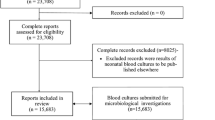Abstract
Uncomplicated Enterobacteriaceae bacteremia is usually transient and may not require follow-up blood cultures (FUBC). This is a retrospective observational study conducted at a university-affiliated urban teaching hospital in Seattle, WA. All patients ≥ 18 years hospitalized between July 2014 and August 2019 with ≥ 1 positive blood culture for either Escherichia coli or Klebsiella species were included. The primary outcome was to determine the number and frequency of FUBC obtained, and the detection rate for positive FUBC. There were 335 episodes of E. coli and Klebsiella spp. bacteremia with genitourinary (54%) being the most common source. FUBC were sent in 299 (89.3%) patients, with a median of 3 (interquartile range (IQR): 2, 4) sets of FUBC drawn per patient. Persistent bacteremia occurred in 37 (12.4%) patients. In uncomplicated E. coli and Klebsiella spp. bacteremia, when the pre-test probability of persistent bacteremia is relatively low, FUBC may not be necessary in the absence of predisposing factors.
Similar content being viewed by others
References
Seifert H (2009) The clinical importance of microbiological findings in the diagnosis and management of bloodstream infections. Clin Infect Dis 48(Suppl 4):S238–S245
Coburn B, Morris AM, Tomlinson G, Detsky AS (2012) Does this adult patient with suspected bacteremia require blood culture? JAMA 308(5):502–511
Wiggers JB, Xiong W, Daneman D (2016) Sending repeat cultures: is there a role in the management of bacteremic episodes? BMC Infect Dis 16:286–295
Canzoneri CN, Akhavan BJ, Tosur Z et al (2017) Follow-up blood cultures in Gram-negative bacteremia: are they needed? Clin Infect Dis 65(11):1776–1779
Jung J, Song KH, Jun KI et al (2020) Predictive scoring models for persistent gram-negative bacteremia that reduce the need for follow-up blood cultures: a retrospective observational cohort study. BMC Infect Dis 20:680–689
Kang CK, Kim ES, Song KH et al (2013) Can a routine follow-up blood culture be justified in Klebsiella pneumoniae bacteremia? A retrospective case-control study. BMC Infect Dis 13(1):365–371
Mitaka H, Gomez T, Lee YI, Perlman DC (2020) Risk factors for positive follow-up blood cultures in Gram-negative bacilli bacteremia: implications for selecting who needs follow-up blood cultures. Open Forum Infect Dis 7(4):ofaa110. https://doi.org/10.1093/ofid/ofaa110
Shi H, Kang CI, Cho SY et al (2019) Follow-up blood cultures add little value in management of bacteremic urinary tract infections. Eur J Clin Microbiol Infect Dis 38:695–702
Chen AI, Bilker WB, Hamilton KW (2018) Blood culture utilization at an academic hospital: addressing a gap in benchmarking. Infect Control Hosp Epidemiol 39:1353–1359
Wiggers JB, Daneman N (2020) The culture of follow-up blood cultures. Clin Microbiol Infect 26(7):811–813
Maskarinec SA, Park LP, Ruffin NA et al (2020) Positive follow-up blood cultures identify high mortality risk among patients with Gram-negative bacteremia. Clin Microbiol Infect 26(7):904–910
Giannella M, Pascale R, Pancaldi L et al (2020) Follow-up blood cultures are associated with improved outcome of patients with gram-negative bloodstream infections: retrospective observational cohort study. Clin Microbiol Infect 26(7):897–903
Spaziante M, Oliva A, Ceccarelli G et al (2020) Follow-up blood cultures in Gram-negative bacilli bacteremia: are they needed for critically ill patients? Minerva Anestesiol 86(5):498–506
Bates DW, Goldman L, Lee TH (1991) Contaminant blood cultures and resource utilization: the true consequences of false-positive results. JAMA 265(3):365–369
Author information
Authors and Affiliations
Corresponding author
Ethics declarations
Conflict of interest
The authors declare that they have no conflict of interest.
Additional information
Publisher’s note
Springer Nature remains neutral with regard to jurisdictional claims in published maps and institutional affiliations.
Rights and permissions
About this article
Cite this article
Chan, J.D., Ta, A., Lynch, J.B. et al. Follow-up blood cultures in E. coli and Klebsiella spp. bacteremia—opportunities for diagnostic and antimicrobial stewardship. Eur J Clin Microbiol Infect Dis 40, 1107–1111 (2021). https://doi.org/10.1007/s10096-020-04141-x
Received:
Accepted:
Published:
Issue Date:
DOI: https://doi.org/10.1007/s10096-020-04141-x




